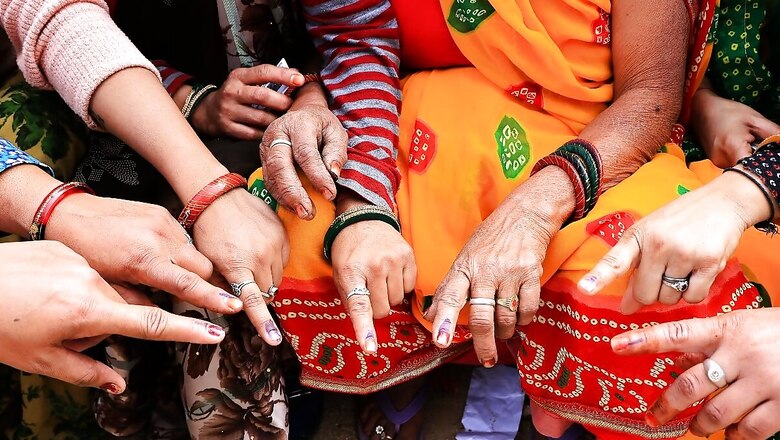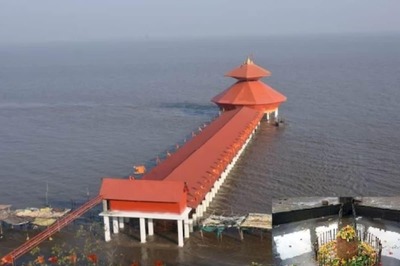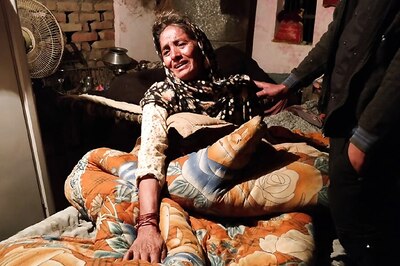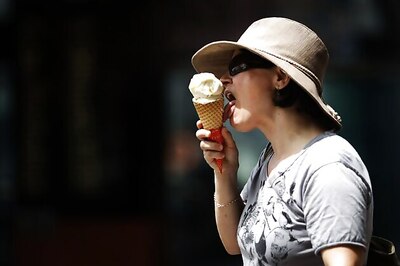
views
The Jhunjhunu Lok Sabha constituency, which lies in the Shekhawati region and is one of Rajasthan’s 25 parliamentary constituencies, falls under the General category. It encompasses the entire Jhunjhunu district and a portion of the Sikar district. The constituency comprises seven legislative assembly segments, which are Pilani (SC), Surajgarh, Jhunjhunu, Mandawa, Nawalgarh, Udaipurwati, Khetri, and Fatehpur. The current MP of Jhunjhunu is Narendra Kumar of the BJP. He was preceded by Santosh Ahlawat of BJP (2014) and Shish Ram Ola of Congress (2009). For the 2024 Lok Sabha elections, the candidates in the fray are Brijendra Ola of the Congress and Shubhkharan Choudhary of BJP. Jhunjhunu will vote in phase 1 of the 2024 battle on April 19 and results will be declared on June 4.
Voting Factors
- BJP Has It Tough: It’s a head-to-head contest between BJP and Congress in Jhunjhunu. The Narendra Modi wave is not as pronounced here as it was in 2014 and 2019, owing to which a tough fight is expected in this seat. The emergence of Jat issues in recent years has brought caste back as a major divider and election equations appear to be reverting to caste-based voting.Poor Performance in 2023: In the 2023 assembly elections, the BJP performed poorly in this seat with the Congress winning six out of eight seats. The BJP holds Nawalgarh and Khetri seats while the Congress holds Pilani, Surajgarh, Jhunjhunu, Mandawa, Udaipurwati and Fatehpur. This is a concerning trend for the BJP.
- Sitting MP Replaced: Narendra Kumar, the incumbent MP from Jhunjhunu, has been replaced with Shubhkaran Choudhary, a former MLA. According to some party officials, Choudhary received support from the central leadership due to the significant Jat vote base in the region. Despite being denied a ticket, Narendra Kumar has vowed to support the party’s campaign in the constituency. In the 2023 assembly election, Kumar was fielded from the Mandawa seat where he had lost. In the 2019 election, Kumar had won with a margin of over 3 lakh votes and 61.57 per cent of the vote share.
- Fresh Face: Shubhkaran Choudhary is a one-time MLA from Udaipurwati. He served in the assembly between 2013-2018 and is a relatively fresh face. He follows an aggressive brand of Jat politics as against the sitting MP’s “soft” Jat image. The BJP high command has handed him a ticket with the hopes that he will be able to fight hard for Jat votes as the party experiences a considerable degree of friction with the community. Shubhkaran Choudhary is not a well-tested figure though and has lost the last two assembly elections which he contested in Rajasthan. However, he is known to be close to Santosh Ahlawat, the former MP from Jhunjhunu. Ahlawat is campaigning aggressively for the BJP and Choudhary here.
- Jat Challenge: Anger against the BJP among Jat voters has become a major headache in the Shekhawati region. Jhunjhunu is a Jat-dominated seat and several issues such as opposition to Agnipath scheme, wrestlers’ protests against Brij Bhushan Sharan Singh, and farmers’ protests for MSP have damaged the BJP’s standing. The dissatisfaction among Jat voters was visible in the assembly elections of 2023. The BJP’s decision to snub Jat leader Rahul Kaswan in the bordering constituency of Churu has also had an effect. Kaswan has sway in the region too, and his failure to win a ticket and subsequent move to Congress has reignited Jat-Rajput rivalry.
- Strongholds: Rajputs are a core vote bank for the BJP in Jhunjunu, and even though they may not be pleased with the selection of an aggressive Jat face as official candidate, their vote is expected to fall in the saffron party’s kitty. Scheduled Caste votes are likely to split evenly between Congress and BJP. But upper caste votes, drawn by national issues and Hindutva are expected to be solidly with the Modi wave.
- Modi Wave vs Caste Equations: It is said that in 2014 and 2019, certain caste loyalties were overridden by overwhelming support for PM Modi. In 2019, apart from several other factors playing in their favour, the BJP performed comfortably well also because of the Balakot airstrikes in Pakistan. PM Modi’s first speech after the airstrikes was in nearby Churu. Since Jhunjhunu comprises a highly patriotic electorate with deep contribution to the Indian Army, this action was celebrated widely. This time around, there is no such buzz, and instead there has been a back-to-back emergence of Jat-associated protests. This has triggered the caste wars of the past, reverting the seat back to traditional caste equations. This, merged with a sizeable Muslim vote, is almost certainly falling in favour of the Congress.
- Congress Upbeat: The Congress finds itself in a relatively favourable place in comparison to 2019. In the 2023 Lok Sabha elections, the Congress bagged six out of eight seats in Churu, and performed similarly well in the larger Shekhawati region, despite ultimately losing the state to the BJP. The party’s candidate Brijendra Ola comes from a powerful political family which also helps the INC’s fortunes here. Ola is the sitting MLA from Jhunjhunu assembly segment and is the son of Shish Ram Ola, a tall Congress leader who passed away in 2013. Shish Ram Ola was a soldier who fought in the second world war and represented the Jhunjhunu Lok Sabha seat for 18 years from 1996 to 2019. Ola is credited with the emergence of Jhunjhunu as an education hub. He also vigorously promoted education for women and girls, which reverberates till this day. He is remembered for his frugal ways and hence, till this day, the Ola family is respected for their contribution to the constituency. Brijendra Ola seeks to ride on this nostalgia and register a victory in 2024.
- Strongholds: Congress is expected to attract the entire Muslim vote bank, which forms about 13.9 per cent of the electorate. This is a strong point for the party. It is further bolstered by a section of Jats who feel discontented with the BJP and may split just enough to serve a victory to the INC.
- No Fans of This RaGa: The lack of a tall national leader is where voter consolidation in favour of Congress is stifled to some degree. The disconnect of the public in Jhunjhunu with Rahul Gandhi stands in sharp contrast with their appreciation for PM Modi, whose power to draw voters by his name is miles ahead of the Gandhi scion.
Voter Demographics (2011 Census):
● Total number of voters (2019): 19.2 lakh
● Urban: 24.8%
● Rural: 75.2%
● Literacy rate: 63.82%
Voters by Caste (Approximate):
● SC: 16.8%
● ST: 1.8%
Voters by Religion (2011 Census):
● Muslim: 13.9%
● Hindu: 84.5%
● Christian: 0.05%
● Sikh: 1.5%
Key constituency issues
- Santosh Ahlawat Sparks Controversy: Former BJP MP from Rajasthan’s Jhunjhunu, Santosh Ahlawat, sparked controversy recently with her alleged statement to party workers, suggesting that government employees who do not vote for PM Modi should not be allowed to work in their offices after the elections. The remarks have drawn strong criticism, particularly from Congress MLA Sharwan Kumar from Surajgarh, who questioned why the Election Commission has not taken action. Ahlawat’s comments, delivered in the Bagri dialect amidst cheers from supporters, included an “open invitation” for government officials to “learn to behave or pack their bags”.
- “Lal Diary” Leader Rajendra Singh Gudha’s Allegation: This former Congress leader was earlier removed from the party after he stirred up a storm alleging that he had a red diary full of details implicating Congress leaders of corruption. Gudha has re-emerged and this time he has sprayed a volley of attacks on BJP candidate Shubhkaran Choudhary, accusing him of corruption and casteism. On his social media page, Gudha has alleged Chaudhary has links to toll mafia, and called him an anti-Dalit leader. However, Gudha has refrained from attacking PM Modi directly.
- Strong Opposition to Agnipath Scheme: The Agniveer scheme is another issue on the ballot as local youth view the scheme as a limitation on their aspirations to join the Army, which is one of the few popular avenues for employment. Jhunjhunu poses a particularly potent challenge to the BJP on this matter as this district is said to be the greater contributor of soldiers to the Indian Army. Here, serving in the army is seen as a dream career and not just some temporary service.
- Indian Wrestlers’ Protest: The protest by Indian wrestlers over sexual harassment allegations against BJP MP Brij Bhushan Sharan Singh has stirred opposition leaders and resonated within the Jat community. This could go against the saffron party.
- Farmers’ issues: Farmers in this predominantly rural constituency encounter numerous challenges, including water scarcity, lack of irrigation facilities, declining crop yields, and diminishing incomes. Additionally, they have expressed dissatisfaction with the government’s MSP, and criticise the crop insurance scheme for insufficient coverage. Spearheaded by the Jat community, farmer protests have gained substantial traction in this area.
- Lack of Industries and Unemployment: Joblessness is a major issue in Jhunjhunu. Many mega industrialists and businessmen of India like Birlas, the Piramals and Rakesh Jhunjhunwala have their origins in Jhunjhunu. Despite this, there is an acute lack of industries in this region. There is also a lack of facilities and resources for industrial activity such as water and electricity. This is in sharp contract to neighbouring Ajmer, which is a bustling hub employing lakhs of people. While most youth enter into seasonal farming in Jhunjhunu, the income is limited. Others vie for government jobs and recruitment in the Army.
- Hindutva: Hindutva is a major factor that many voters are drawn towards. The Ram Mandir inauguration is seen as an impactful event here. Polarisation of Hindu votes is also evident in many Scheduled Caste and forward communities where caste affiliations have taken a back seat.
- Water Crisis: Water scarcity is prevalent in this area due to elevated levels of fluoride in the groundwater, resulting in a drinking water shortage. Groundwater depletion has receded the water table significantly in the last few decades. This lack of water not only starves the region’s economic potential but also affects the availability of drinking water, a problem which shows up even in winters.
- Electricity issues: People are also facing a significant shortage of electricity which has affected farmers the most. Blackouts are common and farmers allege that electricity remains cut off for hours on end and remains unreliable the rest of the time. The present government has resumed a project to upgrade the power system in Jhunjhunu which may address the issues of the locals here.
Infrastructure Development
- Railway Infrastructure: In September 2022, the North Western railways announced the electrification of Jhunjhunu-Sikar-Loharu railway line. The move was welcomed by the people as it allowed electric trains to be run on the route. As a result, multiple diesel-electric multiple unit trains have been started, providing connectivity to the people in the region at higher speeds. Jhunjhunu railway station is one of the 554 railway stations across the country that will be redeveloped to provide world-class facilities. According to reports, a master plan has already been formulated to overhaul the railway station.
- Road Infrastructure: The construction of a two-lane paved shoulder road from Fatehpur to Jhunjhunu at a cost of ₹116 crore has improved connectivity to the Mandawa tourist area. In September last year, the state government granted a financial approval of Rs 232.10 crore for 139 road construction works in 19 districts of which five will be in Jhunjhunu.
- Under the Viksit Bharat Viksit Rajasthan programme, PM Modi had inaugurated a slew of projects that will improve road infrastructure in Jhunjhunu, Abu Road and Tonk districts of Rajasthan.
- Water Supply Development programme: Rajasthan was granted around Rs 3,000 crore by Japan International Cooperation Agency (JICA) in 2021 to improve rural water supply and treat fluorosis. The major beneficiaries have been Jhunjhunu and Barmer districts, which will receive clean drinking water.
- Yamuna Water: In February, the governments of Haryana and Rajasthan had signed a Memorandum of Understanding (MoU) to efficiently utilise excess rainwater from the Yamuna river. The project aims to transfer Yamuna’s water through underground pipelines to the Shekhawati region, including areas like Churu and Jhunjhunu and help increase Rajasthan’s consumption of its share of Yamuna water at Hathnikund. This serves a long-pending demand for water in the region.
- College Infrastructure: On July 27, 2023, PM Modi had virtually laid down the foundation stone of Jhunjhunu Medical college. The Cabinet had approved the construction of the medical college back in 2019, and construction is currently underway. It is expected to start admitting students in July of this year. Jhunjhunu is a major education hub in Rajasthan accounting for almost 5-10 per cent of all the state’s total educational institutes. It boasts around 20 major schools and colleges, including BITS Pilani, 3 Kendriya Vidyalayas etc. Jhunjhunu boasts of having the fourth highest number of graduates in Rajasthan.
- Electricity: The project to upgrade the power system in Jhunjhunu, initiated in September under the RDHS scheme, has resumed after a brief stoppage due to state elections. A total of Rs 413 crore will be allocated for enhancing the electricity infrastructure in Jhunjhunu.



















Comments
0 comment